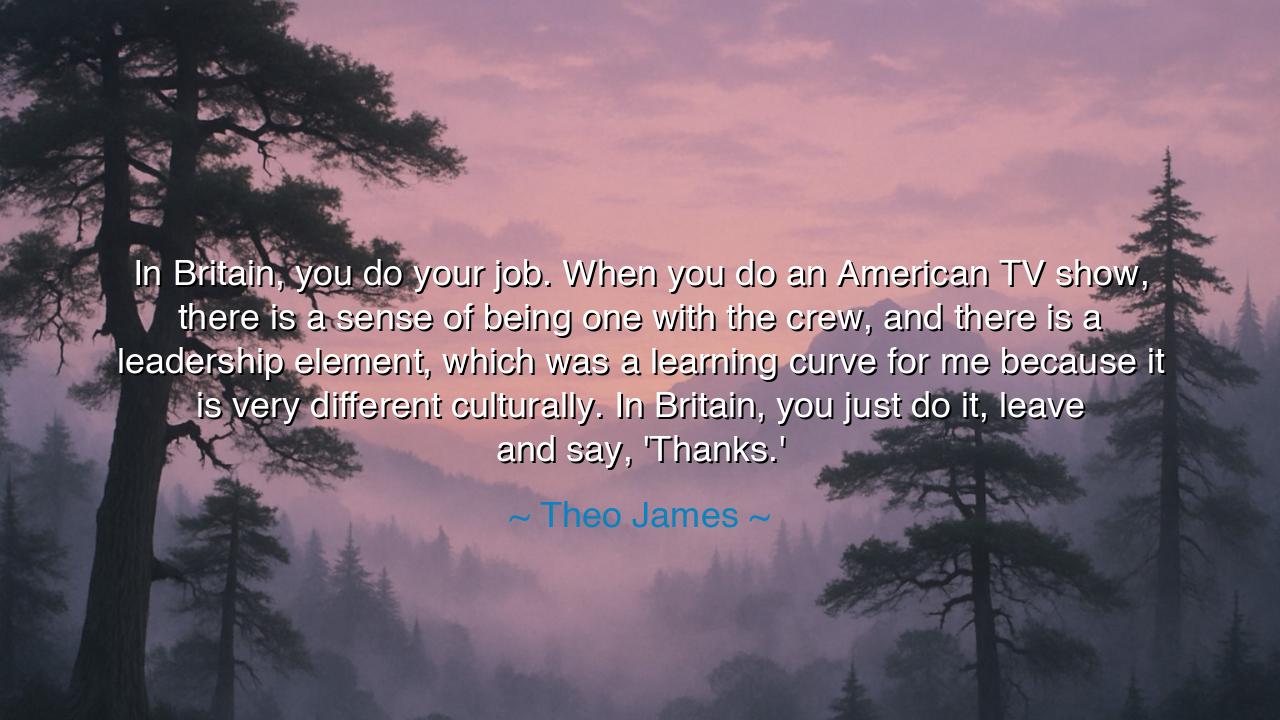
In Britain, you do your job. When you do an American TV show
In Britain, you do your job. When you do an American TV show, there is a sense of being one with the crew, and there is a leadership element, which was a learning curve for me because it is very different culturally. In Britain, you just do it, leave and say, 'Thanks.'






The words of Theo James—“In Britain, you do your job. When you do an American TV show, there is a sense of being one with the crew, and there is a leadership element, which was a learning curve for me because it is very different culturally. In Britain, you just do it, leave and say, 'Thanks.'”—carry with them not only the reflection of an actor’s experience, but also the deeper truth about the ways in which cultures shape work, leadership, and community. His words reveal a contrast: on one side, the British ethic of duty—to work diligently, with little fuss, and quietly depart; on the other, the American sense of collaboration and leadership, where work is bound together in shared spirit, and where individuals are expected to step into a role of guidance and unity.
To say that in Britain, you do your job is to speak of a culture rooted in discipline, modesty, and a sense of personal boundaries. The British worker, shaped by centuries of tradition, does not linger in self-celebration nor in excessive familiarity. Work is to be done with efficiency, professionalism, and restraint. It is a philosophy of labor as obligation: fulfill your duty, give your best, then step back without seeking to claim the spotlight. This approach reflects a kind of stoicism, an ancient humility that values the task over the individual.
Yet in America, James notes, there is a different rhythm—a sense of being one with the crew. Here, the work is not simply individual performance but communal endeavor. The actor is not isolated, but intertwined with every technician, writer, and assistant. The set becomes not a place of mere duty but of shared vision. And with this comes the expectation of leadership: that the star must not only deliver their role but also inspire, unify, and carry the energy of the group. This leadership is not imposed by rank but by culture, a living bond that elevates the collective above the solitary.
History itself provides examples of these contrasting spirits. Consider the building of the medieval cathedrals in Europe. In Britain, the mason carved his stone with care, his name often forgotten, his work folded into the grandeur of the whole. The focus was on duty, on completion, on service. In contrast, the spirit of the New World—seen in the bold projects of America, from the Hoover Dam to the Apollo missions—was often infused with visible collaboration, where leaders stood alongside their teams, names were celebrated, and the crew became one body striving toward a shared, monumental goal. Both ways produced greatness, but their paths differed: one in quiet duty, the other in collective fire.
Theo James speaks of this contrast as a learning curve. To move from one culture to another is to be stretched, to be tested in humility and in adaptability. For him, it meant learning that to excel in America was not only to act well but to step forward, to embrace leadership, to join fully with others. This is the deeper truth: that growth often comes when we cross boundaries, when we move from the familiar to the foreign, when we must learn not only new skills but new ways of being.
The lesson here is profound: work is not only the task but the spirit in which it is done. Sometimes, we are called to the British way—to do with quiet excellence, without demand for recognition. At other times, we are called to the American way—to step into unity, to lead with courage, to kindle in others the fire of purpose. Wisdom lies in discerning which moment requires which spirit, and in being humble enough to learn from both.
So, O listener, carry this teaching with you. Do your work with diligence, yes—but also seek to be one with the crew. Practice humility when it is time to be silent, and practice leadership when it is time to inspire. Do not be rigid in one way of working, for cultures differ, and wisdom demands adaptability. Learn, as Theo James learned, that greatness often lies not in clinging to one tradition but in blending the strengths of many. For he who can both serve with quiet duty and lead with communal fire is one who will always find a place, in any land, among any people.






AAdministratorAdministrator
Welcome, honored guests. Please leave a comment, we will respond soon